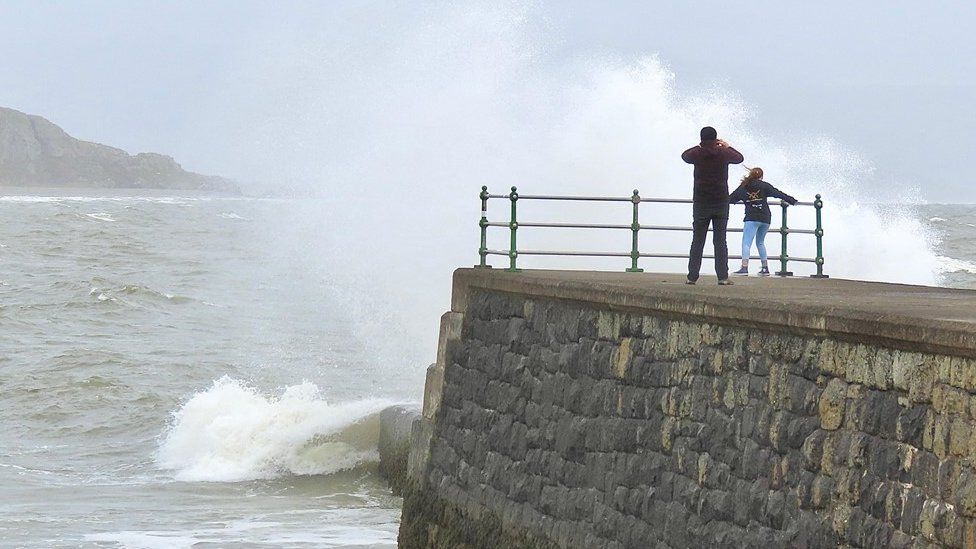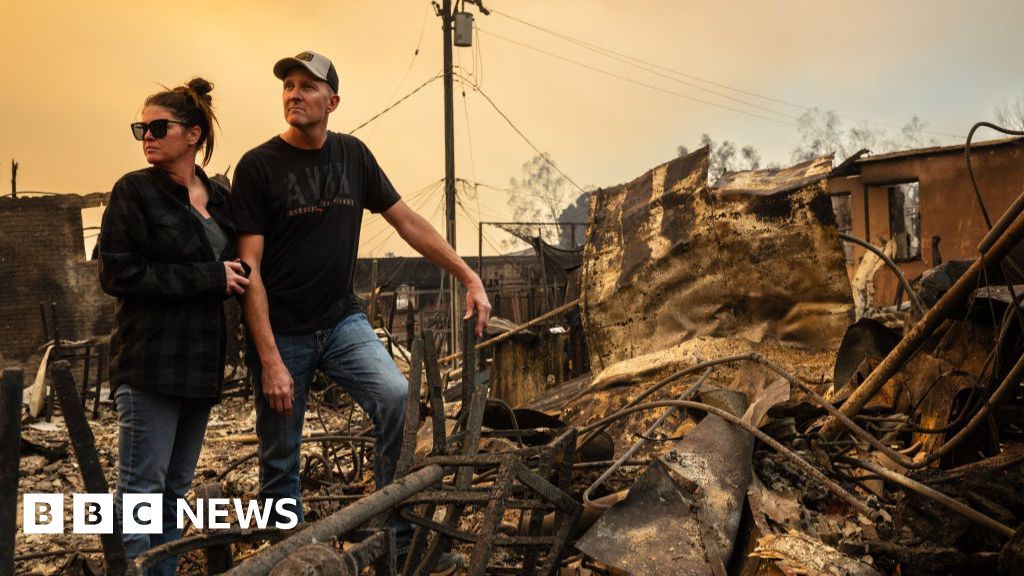 Image source, BBC Weather Watcher/snaphappydave
Image source, BBC Weather Watcher/snaphappydave
The Met Office has issued a yellow weather warning for wind
Dozens of flights have been cancelled as Storm Kathleen brings strong winds and the warmest day of the year so far to the UK.
About 140 flights departing and arriving at UK airports were cancelled after the Met Office issued a yellow weather warning for wind.
Rail and ferry services have also been affected in Scotland.
Gusts of over 70mph have swept through parts of the UK and temperatures hit 21.4C (70.5F) in eastern England.
The year's warmest temperature was recorded in Lakenheath, Suffolk, on Saturday - beating the previous high of 19.9C in north-west Scotland in January.
The most significant impacts of the storm have been felt in the north-west and south-west of England and parts of Northern Ireland, Scotland and Wales.
Thousands of passengers experienced delays when flights were cancelled at airports including Heathrow, Manchester, Birmingham, Edinburgh and Belfast City.
The vast majority of flights affected were those travelling within the UK and to and from the island of Ireland.
EasyJet flights to and from the Isle of Man were also halted.
Titanic Belfast roof damaged by Storm Kathleen
The 11th named storm in eight months, Storm Kathleen was named by the Irish met service, Met Éireann, because the Republic of Ireland was expected to feel its effects most acutely.
Tens of thousands of customers have been left without electricity as the storm moves across the island of Ireland, where trees have fallen in the strong winds.
And in Northern Ireland, part of the roof of the Titanic Belfast museum was damaged by the storm.
Some Irish Sea coastal regions have seen gusts of 69mph (111km/h) and large waves.
Coastal areas in Ireland have been hit by high winds
Parts of Scotland have also seen very high winds, with the UK's strongest gusts of 101mph recorded at the summit of Cairngorm, a mountain in the Scottish Highlands.
In Capel Curing, north Wales, wind speeds reached 68mph.
P&O Ferries cancelled ferry services travelling between Larne in Northern Ireland and Cairnryan in Scotland, with ferry services to and from the Isle of Man also disrupted.
The strong winds have also seen sports matches rearranged, with Saturday evening's EPCR Challenge Cup rugby match between Edinburgh and Bayonne moved from the Hive Stadium to Murrayfield.
Storm Kathleen is expected to ease by Sunday evening.
Image source, BBC Weather Watcher / Aspers
Image caption,The Met Office has warned of "large waves and beach material being thrown onto sea fronts"
BBC weather forecaster George Goodfellow said the storm had brought warm air from north-west Africa over the North Atlantic.
He said: "It's still sat out there to the west of the UK - it's fairly slow-moving, as much as we've had strong winds. We're expecting further strong winds tomorrow as well."
While eastern parts of the country have been "a bit on the windy side in places, the main thing is how warm it's been," the forecaster added.
"It's not unusual to get such warm temperatures in April, but looking at the temperatures we've had recently, [Saturday is] quite a lot warmer than it has been. To suddenly break through the 20 degree barrier is quite impressive," he said.
The highest recorded temperature for April was 29.4C, recorded in Camden Square in London in 1949, Mr Goodfellow said.
While the storm is not unusual in terms of its intensity, he said the fact Storm Kathleen will last until Sunday means "it's a fairly long-lived thing."
More than 110 flood alerts are in place across England. The Environment Agency has issued 15 flood warnings where flooding is expected.
RAC Breakdown spokesman Rod Dennis said: "This intense period of stormy weather is going to prove extremely challenging for anyone driving on the western side of the UK.
"We strongly urge drivers to avoid exposed coasts and higher routes where the impact of the very strong winds is most likely to be felt."
Are you affected by the issues raised in this story? Share your experiences by emailing haveyoursay@bbc.co.uk.
Please include a contact number if you are willing to speak to a BBC journalist. You can also get in touch in the following ways:
If you are reading this page and can't see the form you will need to visit the mobile version of the BBC website to submit your question or comment or you can email us at HaveYourSay@bbc.co.uk. Please include your name, age and location with any submission.
 (1).png)
 9 months ago
14
9 months ago
14


















